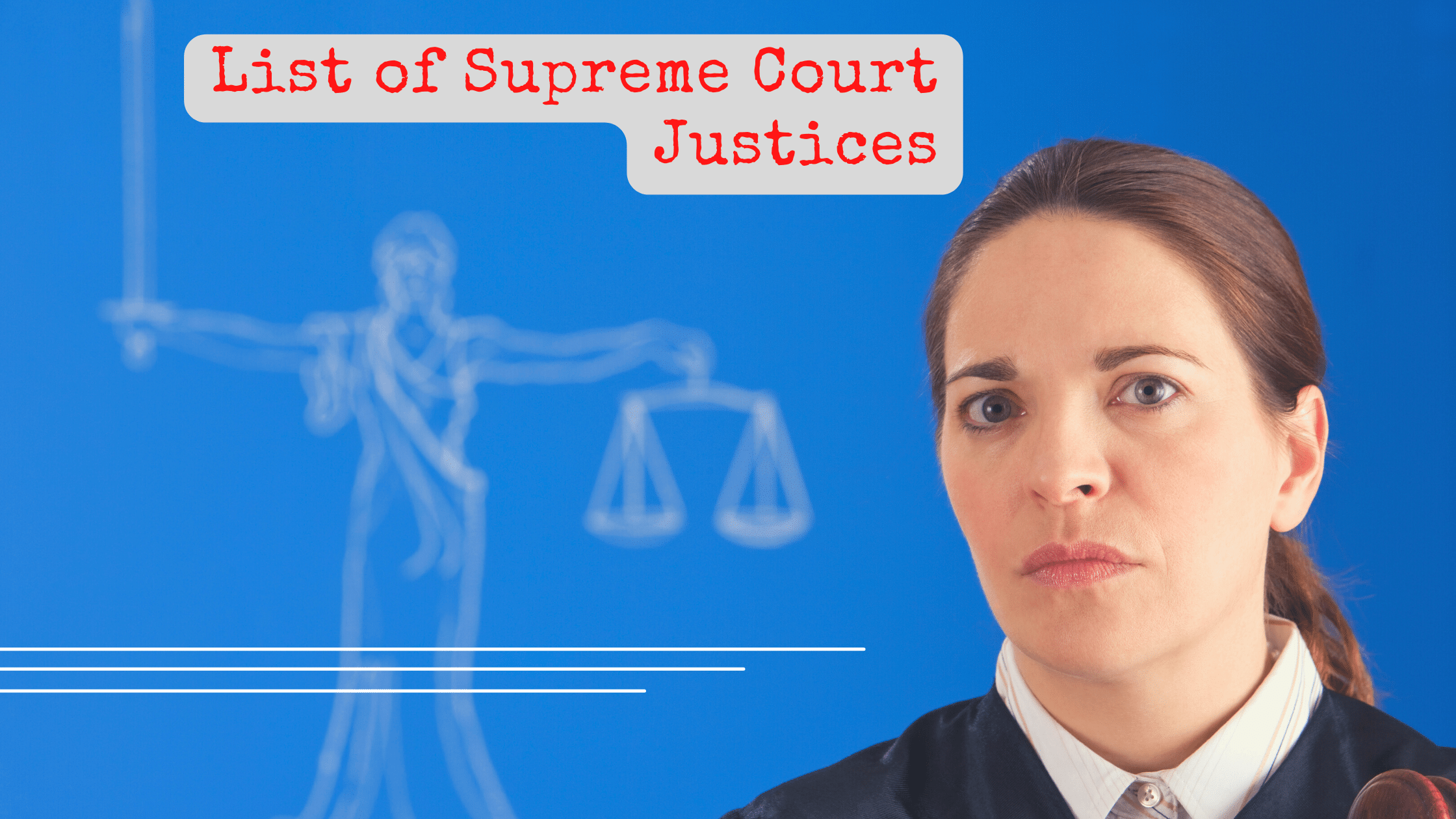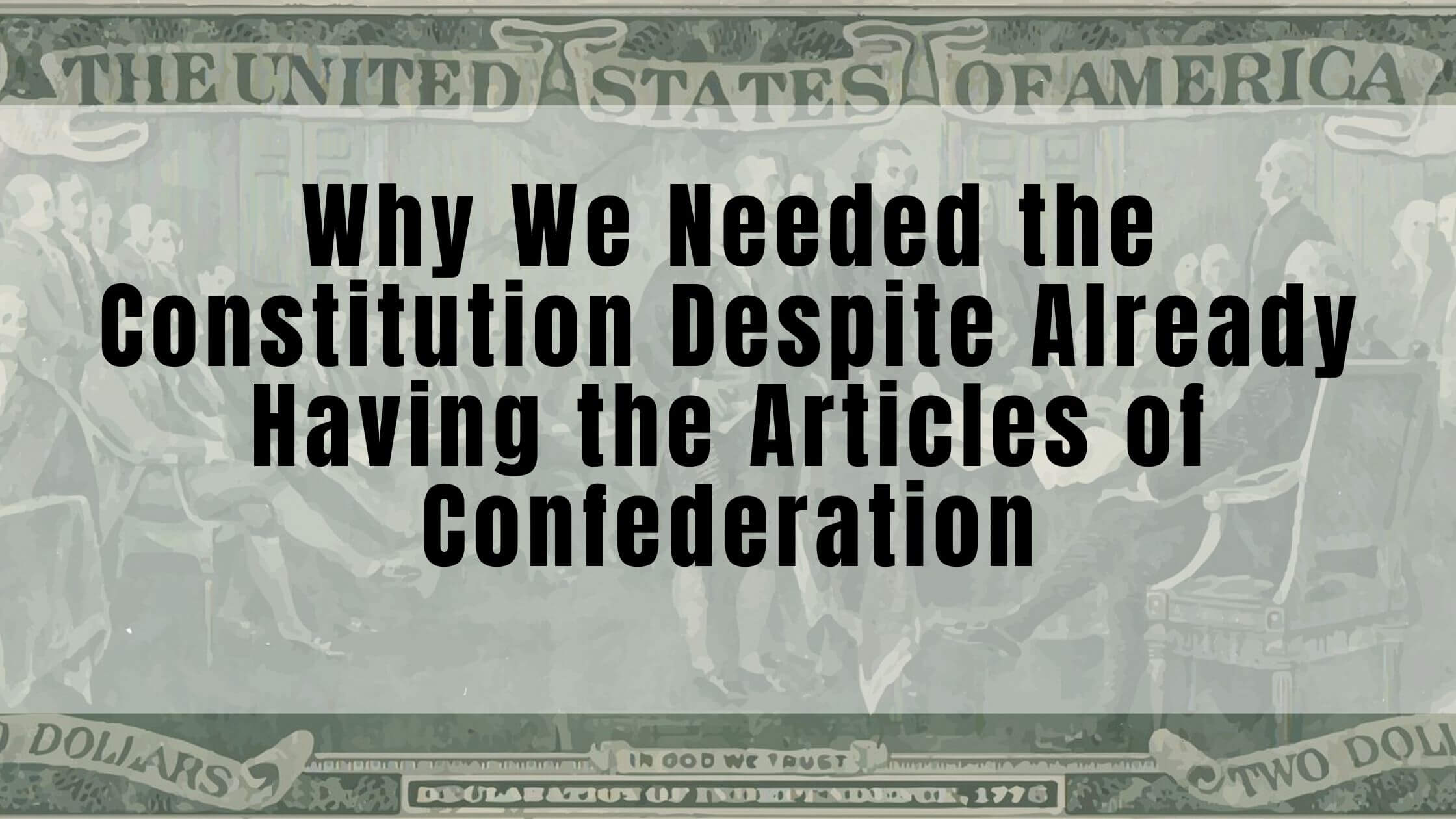Table of Contents
ToggleSources
- https://www.senate.gov/about/powers-procedures/impeachment/impeachment-johnson.htm
This is an authoritative source from the U.S. Senate's official website, providing detailed information about Andrew Johnson's impeachment, including the Tenure of Office Act and the political context. - https://www.history.com/topics/us-presidents/andrew-johnson
History.com is a reliable source for historical events, and this page provides a comprehensive overview of Andrew Johnson's presidency, impeachment, and the Reconstruction era. - https://www.loc.gov/law/help/statutes-at-large/39th-congress/session-2/c39s2ch154.pdf
This is the original text of the Tenure of Office Act from the Library of Congress, providing primary source documentation of the law central to Johnson's impeachment. - https://www.archives.gov/milestone-documents/articles-of-impeachment-of-andrew-johnson
The National Archives provides the original articles of impeachment against Andrew Johnson, making it an authoritative primary source for the charges brought against him. - https://www.britannica.com/biography/Andrew-Johnson
Encyclopedia Britannica is a respected reference source, and this entry provides a balanced overview of Johnson's presidency, impeachment, and the political conflicts of the era.
Key Points
- Andrew Johnson was the 17th U.S. president and the first to be impeached, though not convicted.
- Johnson's impeachment stemmed from violating the Tenure of Office Act by removing Secretary of War Edwin M. Stanton without Senate approval.
- The Tenure of Office Act was designed to protect Stanton, a Radical Republican ally, from being fired by Johnson.
- Johnson and Congress clashed over Reconstruction: Johnson favored leniency for Southern states, while Radical Republicans sought stricter measures and rights for freed slaves.
- Johnson's suspension of Stanton and subsequent replacement attempts were seen as efforts to undermine Radical Republican Reconstruction plans.
- The House of Representatives impeached Johnson on charges including violating the Tenure of Office Act, led by Radical Republican Thaddeus Stevens.
- The Senate trial focused on whether Johnson's actions were unconstitutional or a challenge to the Tenure of Office Act's validity.
- Johnson was acquitted by one vote, falling short of the two-thirds majority needed for conviction, and served out his term.
- The Tenure of Office Act was later deemed likely unconstitutional by the Supreme Court in 1926.
- Johnson's impeachment set a precedent, with later presidents like Bill Clinton and Donald Trump also facing impeachment trials.
Summary
Andrew Johnson, the 17th U.S. president, was impeached for violating the Tenure of Office Act by removing Secretary of War Edwin Stanton without Senate approval, a move aimed at obstructing Radical Republicans' Reconstruction plans. Though the House impeached him, Johnson narrowly avoided conviction in the Senate by one vote, allowing him to serve out his term. The impeachment highlighted the intense political conflict over Reconstruction and the balance of power between the presidency and Congress.
Andrew Johnson was the 17th president of the United States, taking office after the assassination of President Abraham Lincoln. He was the first president to be impeached by Congress, although this didn’t result in a conviction.
Why was Andrew Johnson impeached?
The simple answer is that he was accused of breaking the law. Specifically, his actions challenged an act of Congress passed one year before, known as the Tenure of Office Act.
More generally, Johnson had been in a running battle with Congress since late 1865. This confrontation between the executive and legislature resulted from opposing views on the most important issue of Johnson’s presidency. This was how to tackle Reconstruction, and the Reintegration of rebel states defeated in the American Civil War.
What Was the Tenure of Office Act?
The Tenure of Office Act stipulated that the president could not remove members of his Cabinet without the approval of the Senate.

The act was passed largely to protect Edwin M. Stanton, Lincoln’s Secretary of War, who had carried over that position to Johnson’s Cabinet.
Stanton was aligned with the so-called Radical Republicans, Johnson’s primary opponents in the United States Congress.
Whereas Johnson wanted to be lenient with Southern states, letting them establish new constitutions and state governments with little federal oversight, Radical Republicans were harsher.
They wanted to restrict ex-Confederates from rejoining Congress and ensure that freed African American slaves were guaranteed rights (such as the right to vote).
Edwin M. Stanton – A Boon for Republicans and an Obstacle for Johnson
Despite Johnson’s efforts to wrest control of Congress away from Republicans, they won an even larger majority in both houses during the 1866 midterms.
They could now pass laws despite Johnson’s constant vetoes.
The Radical Republican plan for the South, which involved carving it into military districts, required the collaboration of whoever was leading the Department of War. In this case, it was Edwin M. Stanton who was fully on board with Radical Republican plans.
In other words, Stanton was the key to Congress executing their vision for Reconstruction. If Johnson could replace him, he could frustrate the Radical Republicans’ plans, and that’s exactly what he did, resulting in his impeachment.
Johnson Violates the Tenure of Office Act
Back in the 19th century, Congress only met for a few months of the year. According to the Act, President Andrew Johnson was permitted to remove members of the Cabinet while Congress was not in session.

Get Smarter on US News, History, and the Constitution
Join the thousands of fellow patriots who rely on our 5-minute newsletter to stay informed on the key events and trends that shaped our nation's past and continue to shape its present.

However, if the Senate did not approve of this change when they reconvened, the president would have to reinstate the original official.
So, while Congress was in recess, Johnson suspended Stanton, replacing him with Ulysses S. Grant. When the Senate reconvened in December, they did not approve the replacement, and Grant resigned.
By this point, Johnson was no longer interested in working within the confines of the Tenure of Office Act. He simply announced to the Senate that he had chosen general Lorenzo Thomas as the new Secretary of War.
The House Votes for Impeachment
The charge of impeachment was led by Thaddeus Stevens, a Radical Republican leader whom Johnson had previously called a traitor.
Stevens announced that this was not a partisan impeachment but one that would determine the future of the entire nation.
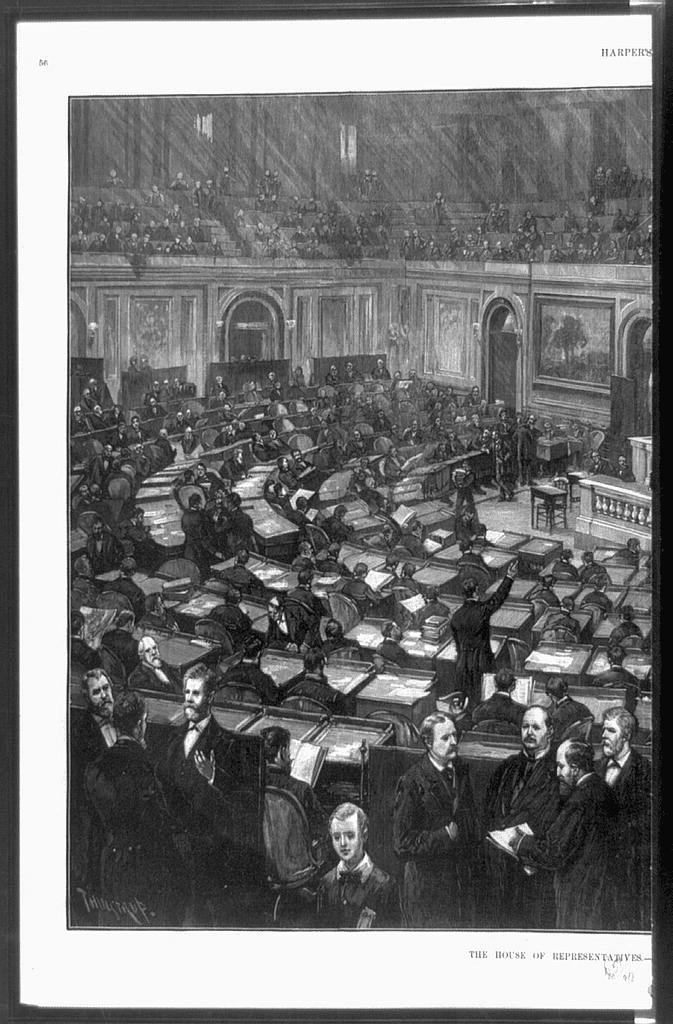
A resolution to try Johnson based on “high crimes and misdemeanors” (the requirement for the president’s impeachment as per the Constitution) was voted on in the House of Representatives on February 24, 1868. It passed 126-47 (possibly 128-47 – there are conflicting reports).
This vote was largely along partisan lines, with most Republicans voting in favor and most Democrats voting against.
Articles of Impeachment
As per the United States Constitution, the House of Representatives votes on whether or not to impeach, and the Senate convicts the president or dismisses the accusations against him.
The next step in the process was for the House to draft specific charges against the president.
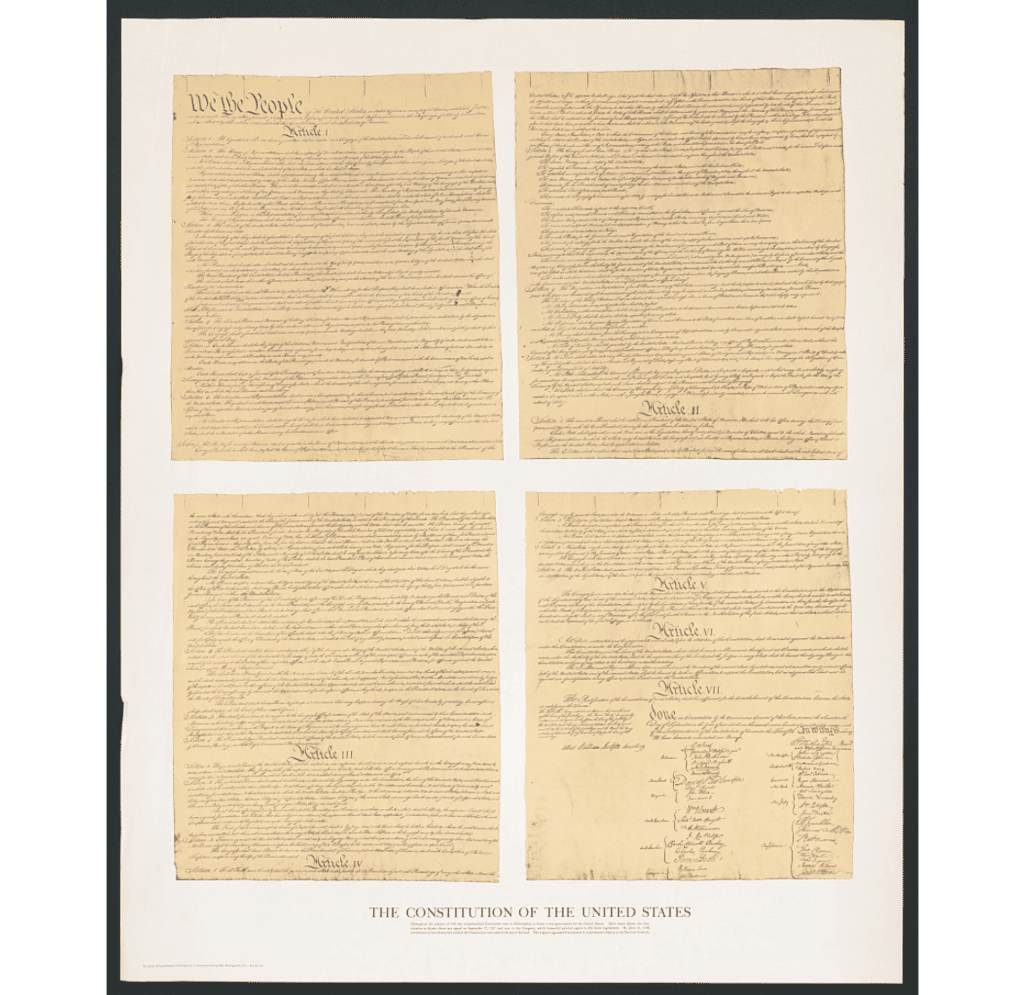
Eleven articles of impeachment were created – nine of these had to do with Johnson’s violation of the Tenure of Office Act. At the same time, another claimed he’d violated the Command of Army Act, and another that he’d made threats against members of Congress.
On March 4, 1868, the articles of impeachment were introduced to the Senate, and President Johnson’s impeachment trial began. Chief Justice Salmon P. Chase presided.
Trial in the Senate
It’s important to note that there had always been a question of whether the Tenure of Office Act was constitutional. In fact, the Supreme Court found it was “likely” unconstitutional decades later, in 1926.
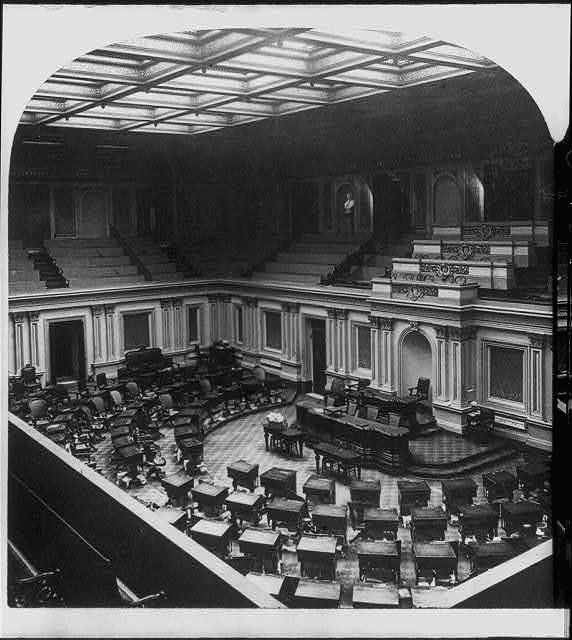
In response to the argument on whether the act was constitutional, the prosecution argued that even if the president thought the law unconstitutional, he still had to obey it.
Members of Congress were, after all, the representatives of the people, and so, they reasoned, Johnson had violated the people’s will.
Since the articles of impeachment implied that Johnson had intended to violate the act, his defense argued that the intent was to challenge the act’s constitutionality by bringing it to the Supreme Court.
They also argued that since President Lincoln had appointed Stanton, the Tenure of Office Act did not protect him from being fired by Johnson.
The Outcome
After several months of debate, the eleventh article of impeachment was voted on first. This vote came to 32 for, 21 against – Johnson was acquitted on this charge as it fell just one vote short of the two-thirds majority required to convict.
Following a 10-day hiatus, the vote was the same for the second and third articles – 32 for and 21 against.

33 votes would be necessary to achieve the two-thirds majority required by the Constitution to convict Johnson. Seeing which way the wind was blowing, the Senate adjourned on May 26 without voting on the eight other articles.
This is why we can say that Johnson was acquitted by just one vote.
President Johnson would remain in the White House until March 4, 1869. He was viewed as damaged goods by the Democratic Party and did not receive the 1868 presidential nomination – that went to Horatio Seymour, who Ulysses Grant defeated.
Modern-Day Impeachment Trials
Andrew Johnson is not the only president to face an impeachment trial. In modern times, Bill Clinton and Donald Trump have both faced impeachment proceedings and a Senate trial.
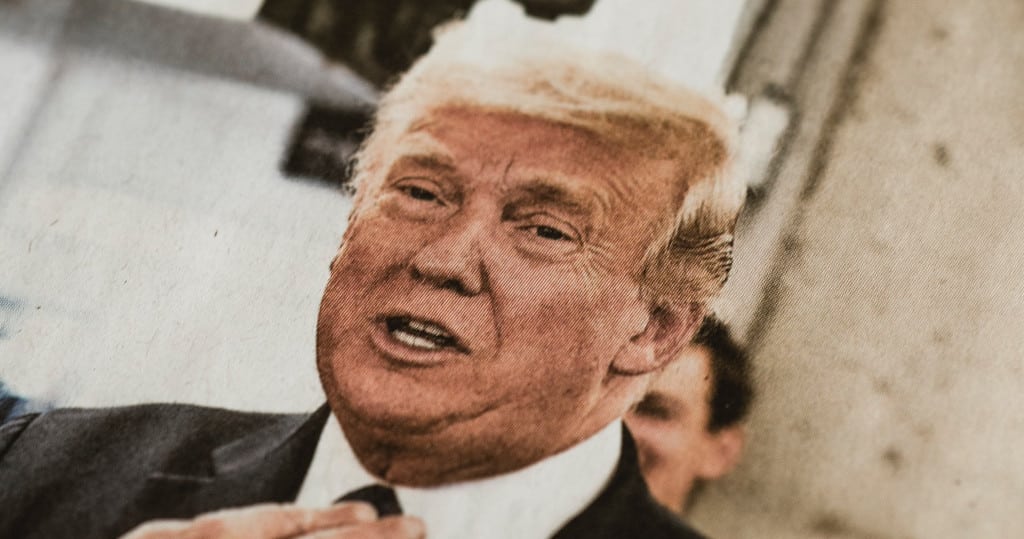
Quiz Questions about the Impeachment of Andrew Johnson:
Questions:
-
What was the Tenure of Office Act?
A. A law that stipulated that the president could not remove members of his Cabinet without the approval of the Senate
B. A law that restricted ex-Confederates from rejoining Congress
C. A law that ensured that freed African American slaves were guaranteed rights such as the right to vote
D. A law that required the president to reinstate the original Cabinet member if the Senate did not approve of the replacement -
Why did Andrew Johnson replace Edwin M. Stanton with Ulysses S. Grant while Congress was in recess?
A. To frustrate the Radical Republicans’ plans for Reconstruction
B. To show his support for ex-Confederates
C. To ensure that freed African American slaves were guaranteed rights such as the right to vote
D. To demonstrate his loyalty to the United States -
Who led the charge for impeachment against Andrew Johnson?
A. Thaddeus Stevens
B. Abraham Lincoln
C. Ulysses S. Grant
D. Edwin M. Stanton -
Why did the House of Representatives vote for impeachment on February 24, 1868?
A. To determine the future of the entire nation
B. To punish Johnson for his actions in breaking the Tenure of Office Act
C. To show support for ex-Confederates
D. To demonstrate their loyalty to the United States -
What was the result of the impeachment trial in the Senate?
A. Johnson was convicted and removed from office
B. Johnson was convicted but not removed from office
C. Johnson was acquitted
D. The trial ended in a mistrial -
Who were the Radical Republicans?
A. A group of politicians who wanted to restrict ex-Confederates from rejoining Congress and ensure that freed African American slaves were guaranteed rights such as the right to vote
B. A group of politicians who wanted to be lenient with Southern states and let them establish new constitutions and state governments with little federal oversight
C. A group of politicians who supported the impeachment of Andrew Johnson
D. A group of politicians who opposed the impeachment of Andrew Johnson -
Why did Johnson want to replace Edwin M. Stanton with Ulysses S. Grant?
A. To frustrate the Radical Republicans’ plans for Reconstruction
B. To show his support for ex-Confederates
C. To ensure that freed African American slaves were guaranteed rights such as the right to vote
D. To demonstrate his loyalty to the United States -
Who was Lorenzo Thomas, and what position did he hold in Andrew Johnson’s Cabinet?
A. He was a general and the Secretary of War
B. He was a general and the Secretary of State
C. He was a general and the Secretary of the Treasury
D. He was a general and the Secretary of Defense -
Who did the House of Representatives vote to try Andrew Johnson based on “high crimes and misdemeanors”?
A. Thaddeus Stevens
B. Abraham Lincoln
C. Ulysses S. Grant
D. Edwin M. Stanton -
What did the Senate do when they reconvened in December after Andrew Johnson suspended Edwin M. Stanton and replaced him with Ulysses S. Grant?
A. They approved the replacement
B. They did not approve the replacement, and Grant resigned
C. They voted to impeach Johnson
D. They voted to acquit Johnson
Answers:
- A. A law that stipulated that the president could not remove members of his Cabinet without the approval of the Senate
- A. To frustrate the Radical Republicans’ plans
- A. Thaddeus Stevens
- A. To determine the future of the entire nation
- C. Johnson was acquitted
- A. A group of politicians who wanted to restrict ex-Confederates from rejoining Congress and ensure that freed African American slaves were guaranteed rights such as the right to vote
- A. To frustrate the Radical Republicans’ plans for Reconstruction
- A. He was a general and the Secretary of War
- A. Thaddeus Stevens
- B. They did not approve the replacement, and Grant resigned
Why Was Andrew Johnson Impeached? Quiz
Frequently Asked Questions
What was the Tenure of Office Act?
Why was Andrew Johnson impeached?
Who led the charge for impeachment against Andrew Johnson?
What was the outcome of Andrew Johnson's impeachment trial?
Who were the Radical Republicans?
How useful was this post?
Click on a star to rate it!
Average rating / 5. Vote count:
No votes so far! Be the first to rate this post.
We are sorry that this post was not useful for you!
Let us improve this post!
Tell us how we can improve this post?



